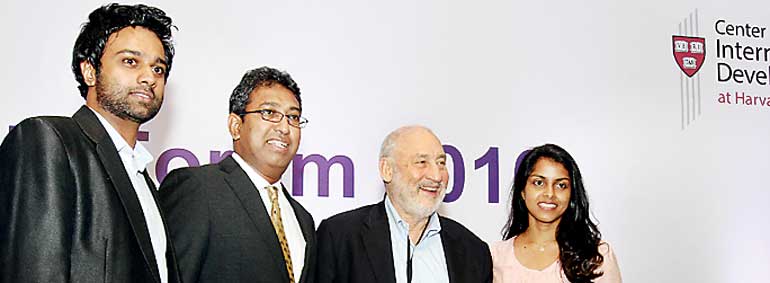Saturday Feb 21, 2026
Saturday Feb 21, 2026
Tuesday, 12 January 2016 00:38 - - {{hitsCtrl.values.hits}}
Importance of entrepreneurship and brain gain came under spotlight at the youth session of the Sri Lanka Economic Forum held last Friday with a timely and mindful exchanges between the panel and two Harvard alumni. The panel included Prime Minister Ranil Wickremesinghe, Nobel LaureateProf.Joseph Stiglitz and Deputy Foreign Minister Harsha De Silva.
Drawing on his professional experience, Jayamin Pelpola (Harvard Business School alumnus, and a venture capitalist investing in Silicon Valley and South Asia), questioned what plans the government has in building a comprehensive framework to develop the entrepreneurial and new venture start-up eco-system in Sri Lanka.

From left: HBS Alumnus Jayamin Pelpola, Deputy Foreign Minister Harsha de Silva, Nobel Laureate Prof. Joseph Stiglitz and Pushpi Weerakoon
Responding to this de Silva agreed the support mechanism for new venture start-ups was still under-developed and their access to financing was severely restricted. He added that the Government had a role in addressing these gaps with small but relevant steps being taken in the 2016 Budget.
Commenting about Sri Lanka’s entrepreneurial eco system, Pelpolaadded: “In Sri Lanka we have good young talent. In the Silicon Valley sometimes we see a bit of what you call ‘too much money chasing too little value’. That’s because some ideas are globally scalable and their IP is protected. We can channel these financial flows to Sri Lanka’s entrepreneurial eco system if we work on three things – firstly, transfer the skills, networks and education of our diaspora; secondly, improve our IP protection; thirdly, be more tolerant of failure and risk especially when you engage smart young people.”
Responding to Pelpola’squestion on what technologies and new developments Sri Lanka should prioritise, Prof.Stiglitz suggested that Sri Lanka should focus on improving access to education through technology. He cited the success of Massive Open Online Courses (MOOCs) in both the developed and developing countries.
Pelpolanoted: “Using technology in education is an area we lag significantly, even compared to the rest of emerging nations. MOOCs for example, bypass the need for huge capital expenditure while distributing knowledge to the masses, as opposed to moving masses towards the centres of education. We can draw from these learnings in enhancing the delivery of our education.”
Drawing on her personal experiences, Weerakoonquestioned the lack ofa proper mechanism to effectively integrate foreign educated graduates into the workforce, going beyond personal and professional connections. As Prof.Stiglitz agreed on the importance of such a mechanism, to drive the point home she described the challenges she navigated in findinga suitable role that utilises her skills upon return.
Weerakoon, a student and personal advisor of Prof.Ricardo Hausmann,graduated in May 2015 with a Masters in Public Administration from the Harvard Kennedy School (HKS) as the prestigious Edith Stokey scholar and Mason fellow. Presently she is the Head of Projects at American Chamber of Commerce.
“Part of the broader solution could be an online centralised registry at the President’s or PM’s office to which the individuals returning could feed information. Our foreign missions could also take a greater interest in the Sri Lankans educated abroad and have an in house collections point abroad which feeds into this centralised system. This registry should be accessible by the publicand the private sector,” Weerakoon added.
“To retain high skilled foreign educates the Government will have to establish a strong investment climate, adequatecompensation and opportunities in the public sector. Even though financial incentives are important, that itself will not encourage returns there will have to be coherentresearch policies formulated, strong public-privatelinkages and competitive funding for innovation. Incentives offered in other countries in addition to recognition and appreciation includes favourable tax treatment of returning human and financial capital, land grants to set up new companies and temporary performance subsidies. We could take guidance from the policies in Latin America including Mexico’s CONACYT and Colombia’s COLFUTURO programs,” she said.
Furthermore, she commented: “Having said this, we should be also mindful that many of us are recruited by multinational companies even before our graduation ceremony, since they visit the universities to catch the best brains early. But this does not mean our country should miss out on foreign domiciled knowledge, technology or finance. If the Government establishes a system conducive for diaspora based on good relations, better facilitative environment, greater utilization and appreciation for their services, we could make use of the brain mobility as brain gain rather than a drain as countries such as Taiwan, Israel, India, China and Chile has done.”
It was refreshing to see the youth engage candidly with the panel and share their innovative ideas, taking a stake in the country’s development.